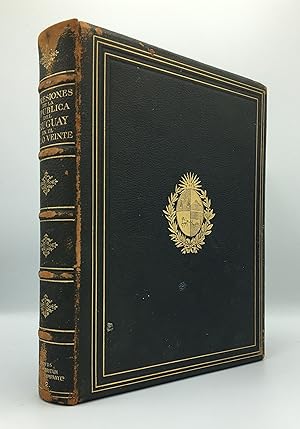Beschreibung
First edition. Large quarto. Publisher's original full dark-green morocco; the upper board triple-ruled in gilt and with the Uruguayan crest in gilt; the spine with five raised bands, compartments ruled and decorated in gilt and with titles in gilt. All edges gilt. Marbled endpapers. Title page, contents page, introduction and first text page with gilt borders and embellishments. Illustrated profusely throughout with black and white photographs and one map. Ownership inscription of the Australian writer Mary Gilmore to the head of the title page: "Mary Gilmore / Her book / 16. 3. 26". A very good copy, the binding square and firm with a few small marks and scuffs to the boards, rubbing to the spine and joints and wear to the corners. The contents with scattered foxing to the endpapers are otherwise in very good order and clean throughout. An interesting association copy of this comprehensive, extensively illustrated, and luxuriously produced survey of the people, culture, history, politics, economy, industry, agriculture, geography, and natural history of Uruguay at the beginning of the twentieth-century, belonging to the influential Australian author, journalist and poet, Dame Mary Gilmore (1865-1962). A prolific contributor to Australian literature and the broader national discourse during the first half of the twentieth-century, Gilmore wrote for a number of leading newspapers and journals of the period, serving as the editor of the women's section of The Australian Worker (1908-1931), as well as The Bulletin, The Sydney Morning Herald, and the Communist Party's Tribune, becoming known as a campaigner for the welfare of the disadvantaged. Her first volume of poetry was issued in 1910, thereafter publishing prodigiously for the ensuing half-century, coming to be regarded as one of Australia's most popular and widely read poets. Her poetry, essays and memoirs covered a wide variety of themes, although public imagination was particularly captured by her evocative views of country life, with her best known work - 'No Foe Shall Gather Our Harvest' - serving as a morale booster during the Second World War. A political progressive, Gilmore gained a reputation as a 'fiery radical' - a champion of the workers and the oppressed. Involving herself with the burgeoning labour movement, early in her life she had become a devotee of the utopian socialism of William Lane (1861-1917). In 1896, Gilmore and two hundred others followed Lane to Paraguay, where they established a communal settlement called New Australia. She started a family there with William Gilmore, whom she married in 1897, but the colony was ultimately short-lived, with Gilmore leaving in 1900, living in Buenos Aires for six months, followed by a period in Patagonia, returning to Australia in 1902 after having saved enough money for a return passage. Gilmore maintained a strong interest in Latin American politics, culture and literature for the rest of her life. Indeed, she also engaged in translation projects, bringing Latin American literature to a wider audience, notably endeavouring to produce a 'Uruguayan anthology', for which she corresponded with friends and associates in the country. This was perhaps also the origin of the present volume, which itself forms a pleasing representation of Gilmore's wide-ranging ambitions. By her later years, Gilmore was a doyenne of the Sydney literary world, and became something of a national icon, making frequent appearances in the new media of radio and television, and maintaining a significant literary output into old age, publishing her last book of verse in 1954, aged 89. She died at the age of 97 and was accorded a state funeral, a rare honour for a writer, and has featured on the reverse of the Australian ten-dollar note since 1993. Bestandsnummer des Verkäufers 1080
Verkäufer kontaktieren
Diesen Artikel melden
![]()




